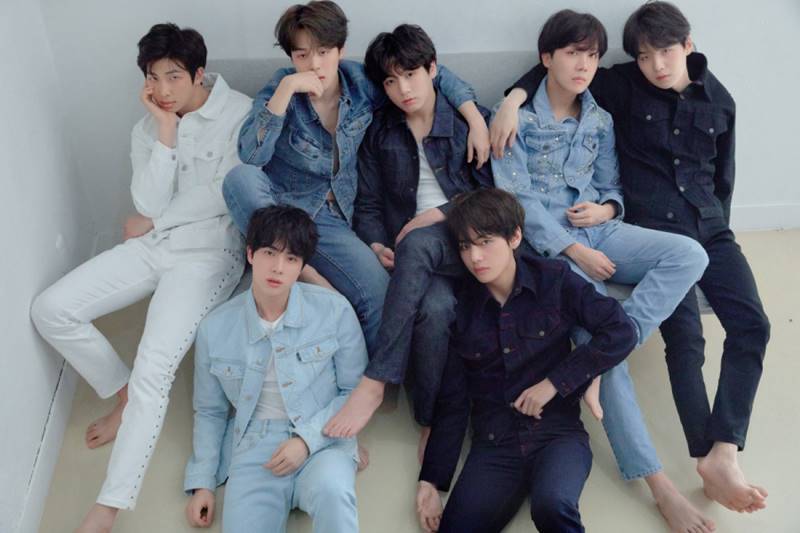
By Jae-Ha Kim
Rolling Stone
May 29, 2018
In modern South Korea, pop stars and politics don’t often mix. While some hip-hop acts (such as Epik High) address controversial topics, many idol groups stick to a slick, apolitical formula with a proven record of success.
BTS, who just became the first K-pop act ever to top the Billboard 200 album sales chart, have become a record-setting success story in part because of their willingness to buck this convention. The seven young men who make up the group have been speaking their minds since their debut, openly discussing LGBTQ rights, mental health and the pressure to succeed – all taboo subjects in South Korea. Their stance is particularly bold given the Korean government’s history of keeping an eye on controversial themes in pop music. By straddling the line between maintaining a respectable image and writing critical lyrics, BTS have offered a refreshing change from what some critics and fans dislike about the K-Pop machine.
The group’s history of open-mindedness dates back to 2013, when they were still rookies and talking about same-sex relationships could have been a career killer. The group’s leader, RM, tweeted out his admiration for Macklemore & Ryan Lewis’ inclusive hit “Same Love” nonetheless: “This is a song about homosexuality. The song is twice as good when I listen to the lyrics.” At the time, he was a relatively unknown musician who had little to lose. But earlier this year, RM once again took a stance on Twitter, recommending “Strawberries and Cigarettes,” a song by the openly gay musician Troye Sivan, from the gay coming-of-age film Love, Simon.
These are small gestures, but they mean a lot to BTS’ fans. LGBTQ rights certainly aren’t perfect in the United States, but in South Korea, the situation is so abysmal that Amnesty International got involved last year after a South Korean soldier was sentenced to six months in prison for having a consensual homosexual relationship.
By speaking out on LGBTQ rights and mental health, BTS are challenging some of K-pop’s biggest unwritten rules https://t.co/a2HTrOsJjN pic.twitter.com/E6QFdb9qI5
— Rolling Stone (@RollingStone) May 29, 2018
Behind the screams that fill any venue where BTS performs are millions of devotees who span generations, genders, religions, nationalities and sexualities. And these fans – collectively known as ARMY – listen intently to the group’s self-penned lyrics and message, before disseminating and translating them into many languages.
For BTS and their fans, acts of generosity often bear a political message. After the Sewol Ferry sank off the coast of South Korea in April 2014, killing almost 300 teenage students, Korea’s politicians tried to distance themselves from the tragedy. Grieving parents participated in hunger strikes, while conservative supporters of then-President Park Geun-Hye downplayed the deaths, saying it was time to put the calamity behind them. Reports later exposed a government-sanctioned blacklist of celebrities who appeared to criticize Park’s regime; while BTS were likely unaware of this, they demonstrated which side they supported by donating $100,000 to benefit the victims’ families.
Several years ago, BTS member Suga told his fans that when he became rich, he would buy them beef – an expensive treat in today’s Korea due to high import duties. For his 25th birthday this year, he fulfilled his promise. But instead of handpicking fans to join him for dinner, he donated $19,000 worth of beef to feed orphans on behalf of ARMY. His fans were delighted and followed suit by making their own charitable donations.
When BTS partnered with the United Nations Children’s Fund (UNICEF) for its “Love Myself” anti-violence campaign, their fans asked how they could help. This May, ARMY played a crucial role in raising $1 million in less than two days for a UNICEF USA campaign to feed malnourished children.
As the group has matured from teenagers into young men, their lyrics have gained more gravitas. So, too, has their outspokenness about the issues that matter to them. They are aware that their fame gives them a huge platform.
Thirty-six South Koreans commit suicide every day, according to a report from Korea’s Ministry of Health and Welfare. While South Korea’s government has been slow to address this problem, some BTS members have been vocal about their own bouts with depression. In their docu-series “Burn the Stage,” a fan said, “Sometimes, BTS is the only reason I wake up in the morning.” In that same episode, RM talked about how depression had previously made him afraid to go back on stage: “I was unable to enjoy things like I used to.” And in their annual New Year’s message to their fans, Suga told them, “It’s okay to live without a dream.”
The group’s members know firsthand about the intense pressures many of their countrymen place on education and the negative impact this can have on mental health. With their songs, BTS tell their fans to fight back and remain alive. “Live as you like, it’s your life anyway,” they sing in the anthemic “Fire.” They continue the theme of survival on their new track, “Paradise,” telling listeners it’s okay to have modest goals: “We deserve a life.”
South Korea’s leadership is listening. After BTS’ historic No. 1 placement on the Billboard 200 this week, President Moon Jae-In said, “BTS has a magical ability to turn sadness into hope, and differences into similarity.”
BTSが世界で成功を収めた理由:K-popのルールや価値観を覆したBTSの軌跡https://t.co/XwO4fd5ZqH#BTS pic.twitter.com/ib1iZZ1lek
— Rolling Stone Japan (@rollingstonejp) May 30, 2018
© 2018 JAE-HA KIM






Tell it Jae. 💜X7
Thank you!!!
Thanks for mentioning their Anti-violence campaign with UNICEF. And for ending the article with a quote from the President of South Korea. “BTS has a magical ability to turn sadness into hope, and differences into similarity.” Really is a real honor. They are making all the differences, especially on how ASIANS are perceived by western media. 🙂
Now THIS is your sweet spot RS, stay out of politics and grown folks subjects plz.
They’re not the first…or the only ones. 😒
I know they aren’t the only ones, but who was the first?
Literally the first sentence in the article mentions Epik High. Not once was it said BTS were the first or only ones, lol. They’re the ones with the largest platform.
Alyssa – They’re not the first ones in music to address controversial topics. They’re neither the first Korean artist to do so. But they’re the first to go this global and massive, doing such musical content, where even Western music reviews are talking about them. Gangnam Style was a parody about rich Korean men, so it wasn’t exactly hard-hitting.
I’m not even an ARMY, I’m a SHINee and DBSK fan. But I can objectively appreciate when someone in K-Pop makes good music, which they do. 3rd gen success was made by their seniors, and BTS is doing something Western-accredited K-Pop hasn’t managed to do until now; be more than just quirky and funny. (Skyler)
Your name is Alyssa and mine is Sam. We’re just stating the obvious, right? What does your statement have to do with anything? Did all the others who were the first have the kind of achievement that bts is having now? I literally don’t understand why you know it alls (or people who think they know it all) speak up like this.
They are doing something significant for Korea but you know haters gonna hate.
There is plenty of excruciatingly shitty music being made in the USA. We need to make sure our oun talentless hacks are taken care of first!
I admire BTS for being socially conscious, and I applaud Rolling Stone for a well written article.
I had almost given up on Rolling Stone until this article. Thanks! I hope that at some point they can actually openly support the LGBTQ community and not skirt the issue if directly asked.
With all due respect though, I would’ve welcomed an article written by a writer who wasn’t openly a fan of BTS on twitter. That way any perceived bias would easily be deflected.
🖕
With all due respect, did it ever occur to you that the article is so good because the writer is knowledgeable about BTS? Why should Rolling Stone hire an inferior writer who knows less about the boys? Why do you describe her as if being “openly” (wtf?) a fan of BTS is dirty or illegal? Rolling Stone isn’t a menu where readers get to pick and choose their journalists based on their own prejudices. ALso how did they skirt the issue? Yoongi said it doesn’t atter who loves who. How is that not open?
Sexist much?
bruceb said: With all due respect though, I would’ve welcomed an article written by a writer who wasn’t openly a fan of BTS on twitter. That way any perceived bias would easily be deflected.
Respect to who? Rolling Stone, because you are certainly not showing respect to the Korean lady who wrote the article. There is a implicit bias MEN have that women who like bands are nothing more than shrieking groupies. If a man had written this article and had tweeted the same tweets, you would not have said this. And let’s take a look at her tweets. She advocates for Asian Representation, talks about Koreans and other Asian Americans, tweets videos by various KPOP groups, talks about how her son likes RM and V, shares news about oppression. Wow, how biased!
Bruce would rather have any MAN write this piece so that people won’t accuse the writer of being a BTS groupie. Bruce, I’ve seen your comments and you’re the one who comes across as biased. Your bias against women is clear.
What part of the article shows bias? If anyone reads bias into it, that’s on them. Do you really think that people who don’t like BTS will be forgiving of the article because it was written by someone who doesn’t like BTS? You’re insane. Antis won’t like anything about BTS. Why should Rolling Stone pander to those people? By your logic, you would forego the best reporter for the job in favor of someone who has never said anything about the subject. So then a Republican who tweeted about Trump can never write about Trump. A Democrat who tweeted about Hillary never never write about the Clintons. By your logic, get someone who has never covered KPOP or even likes it to write about BTS. Does that give them more street cred?
😂😂😂
Hey Bruce, maybe anyone but a Korean should write about Korean bands then so that there’s no perception of nationalistic bias.
👀
See how stupid that sounds? Apologize for being an insulting douchebag.
I agree! This is a wonderful article that you can tell hard work went into. Thankyou!
On a tangent, I see all the male reporters being quiet. Normally they circle jerk expressing their enthusiasm for each other’s work but when women writers write an important piece they give them the silent treatment. What’s the worst is that the Asian American male writing community is complicit in this as well which just adds to the toxicity.
I have to criticize your cowardly need to throw the entire Korean society and kpop industry professionals under the bus in order to praise BTS to Western readers. BTS are brave celebrity activists, but framing them as “taboo breakers of kpop” ignores the LGBTQ-supportive actions and statements of kpop artists like f(x)’s Amber and the late Jonghyun of SHINee. Regarding mental health, you’re ignoring the lyrics of artists like Zion. T, G-Dragon, and again, Jonghyun. You orientalize “Korean society” and construct the kpop industry as exotic in its moral backwardness to solicit readers’ respect for BTS.
next time, Rolling Stone, consider skipping the blatant orientalization and just calling it “non-white group of non-Westerners breaks taboos for global neoliberal society as a whole, but is the first Asian group to get so much Western attention and respect for it. Here’s why people think they’re more revolutionary activists than other kpop artists who also were.”
also note that whenever white Western celebrities do something considered “progressive” the headlines aren’t sensationally marketing them as “the freakishly civilized and progressive exception to the white Western entertainment culture.” But Korean artists can’t even be appreciated for brave advocacy without Westerners taking an accompanying potshot at “Korean society” for being backwards and morally stunted. The author has a korean name and probably thought it would be a good idea to pander to Western readers by depicting Korea, a country that was one of the world’s poorest in 1960 after the US carpet-bombed their peninsula during the Korean War and supported decades of violent military dictatorships under Syngman Rhee and Chun Doohwan, as “backwards” compared to the West and the US, which was the world’s #1 GDP country even in 1960 and has had decades more to attain its shiny standard of “modernized” LGBTQ and mental health rights.
🖕
Speaking of cowardly, you started a whole new disqus account to make this comment? You can’t even put your name to it? Yeah I saw that this was your first and only post. The article is about BTS, which is why it focuses on BTS.
I liked this article. It’s not the best one I’ve read because it was too choppy at the end but it covered a lot of things that hadn’t been addressed before. If you hate things like this then become a reporter and do better. That is my goal. I want to make a difference. I hope i don’t have to cover pop music but I will if called for.
And none of those other kpop bands have broken into US markets to get this kind of attention in Rolling Stone, so fuck off you pedantic fanboy.
My family left Korea for a better life and came to the United States and while it is not perfect here, there is more freedom in all ways than in Korea. This is the piece you want to complain about? I personally think you are being ridiculous and looking for something to be angry at.
How old are you? Did you live in Korea when it was a poor “3rd world country”? What in the article is untrue? It was about BTS and some of the reasons they have succeeded in the U.S. while others have failed to make it here. Do you think she wouldn’t have included those artists and more, given the space and opporunity? This article isn’t about all of K-POP and BTS’s role in it. It’s about BTS. BTS! There is no exoticism or orientalism in this construct, but nice try. Korea is backwards about sexism, racism, homophobia, single mothers, and a whole slew of other things. That doesn’t mean it’s a horrible country, it means it has issues that need to be dealt with. When Western people do something “progressive” as you say, it’s expected. When a Korean Kpop band does it, it’s not expected no matter because Koreans can sue you for draconian defamation laws that are crazy. How many Korean presidents have been put in prison for illegal activities? The ratio is much higher than in the U.S., which hasn’t had the best presidents either, but more honest that the previous Korean presidents. I’m a Moon Jaein stan and hope that he is setting standards for all future politicians. What you see at potshots are facts that you don’t like. She doesn’t need to provide a history lesson on Korea to criticize some of its faults. And honestly the criticism was pretty lowkey.
THIS! I’m not sure how the commenter got orientalism out of anything she wrote.
If you don’t like that she didn’t include certain bands, OK. If you don’t like her writing style, OK. What actual facts did she get wrong though? It sounds to me like you’re just whinging at this point to be honest.
I have seen members of the LGBT community, Koreans, Korean Americans, Americans, Asians, Asian Americans say waht a good article this is and I agree. I have also seen a few people who didn’t like it. In your opinion is everyone else wrong? Are those gay people who showed their like for this article crazy? Are the Koreans and Korean Americans who liked this crazy? I am asking a genuine question. Thank you.
—>
<--- 😂😂😂😂 It sounds like you're trying to say that she gave herself a Korean name so she could pander to western readers! What a moron. She has a Korean name because she was born and raised in Korea and lives in the United States and it sounds like she's old enough (no offense Mrs. Kim) to have lived through what you only read about. This article is a good one in that is speaks about things that are important. Koreans in Korea have these same complaints about their society. Do you want to know why Koreans immigrate to the United States still? Because as bad as the United States can be, there is still more freedom and equality that in Korea. Are you a woman? Go live in Korea and see how far that gets you. Are you a married woman who wants to have a baby? See how long your job will be saved for you. Did you get pregnant and your partner abandoned you? Try raising your baby as a unwed mom and see how society treats you and your innocent baby. They treat you like dirt. Are you a brown foreigner in Korea who would like to get a job? Good luck because the prejudice against you will be difficult to overcome, even if you are very well educated and handsome. I know this exists everywhere in the world but in a article about BTS, all of this does not have to be addressed. You are barking up the wrong tree to make this the hill that you die on. I know I mixed metaphors here but I am not that good in English so forgive me. South Korea is a wonderful country and it is my home and I want to help make it a better place that will accept all people. There are serious issues that need to be addressed and it not having been as wealthy for as long as the United States is a good excuse for you to use but it is not acceptable to my people who want more freedom. We deserve that and what BTS is doing is a really good thing.
☝️ YES, 이사랑!!! Preach!
Therefore no one can ever point out anything negative about countries that are poorer than the United States. That’s what you’re saying essentially. Nowhere in the article did she say that America was so wonderful and the South Korea was primitive. To me it read like she said that things aren’t perfect in the United States, but certain things are even worse in South Korea. How is that wrong, as it applies to BTS and what is happening in South Korea? Is she expected to counter each negative thing about things in Korea with a statement about how things are almost as bad in the United States? Also you are giving the South Koreans a way out by saying that because they had been through so much in the past that their issues of poor human rights should be excused. That is incredibly horrible to the South Koreans who are being mistreated because they are gay.
well I get your point but I wonder if you really know how conservative korean society is and how kpop is viewed in Korea, there are still a lot of issues regarding the behaviour of many idols when it comes to other cultures, etc.
btw the writer is korean so she knows what she’s talking about.
sorry for my poor english
I’m well aware of the current standards in Korean mainstream media when it comes to speaking about the LGBTQ movement and mental health treatment. But as an American, I’m more alarmed and disgusted by the constant “Korea is conservative, US is progressive” rhetoric among even kpop fans that allows complacency, ignorance, or even outright denial of the fact that, for example, the US has supported fascists, terrorists, or drug lords in at least 35 countries, is currently in the grips of a mental health crisis, leads the world in civilian mass shootings, and still practices systemic oppression (economic, legal, violent, etc.) and stigmatization towards its Black citizens, indigenous tribes, working-class population, “illegal immigrants,” and other minorities that gets buried, erased, or sterilized by kpop fans under the mindlessly perpetuated belief that “BUT KOREA IS SO CONSERVATIVE.”
It’s a huuuge diversion from structural inequalities and injustices that are perpetuated BY the supposedly “progressive” white Western countries towards their own minorities and the rest of the world, much of it towards Korea (for example, the No Gun Ri massacre and close to 1 million civilians killed during the Korean War, and more recently the US support of military dictatorships in Korea that killed democratic protesters in the Gwangju Uprising and repressed Korean media/activists through the 60s-early 80s).
The US having (deeply flawed, by the way) non-stigmatized mental health care, legalized gay marriage, and a “politically correct” vocabulary that pays lip service to the LGBTQ movement is still much, much less than the bare minimum of progressiveness expected from a country with decades of military-force-obtained #1 ranking in GDP. If not investing a fraction of that injustice-enabled wealth on de-stigmatizing mental health treatment and cultivating a mainstream culture that expresses “commitment to diversity” and LGBTQ inclusion, what would the US have been doing? I’d assert that far from being “progressive” for being where it is now, the US is actually just doing the bare minimum considering its historical and current economic/military power over countries like South Korea.
My comment wasn’t meant to falsely claim that Korean society overall is currently supportive or even accepting of LGBTQ lifestyles or mental health care (but which countries are?). It was meant to point out the sheer hypocrisy and ridiculousness of painting a country as “less progressive” or “conservative” when your standards for a “progressive country” is one that has murdered, enslaved, exploited, colonized, and silenced millions of people around the world while sitting on the world’s most massive GDP…which was built on those previous atrocities, none of which “conservative”/“less progressive” Korea has ever committed.
And by propagating and affirming the dichotomy of “progressive West, conservative/backwards Korea,” we continue to ensure that imperialist powers like the US, which consolidated its wealth and power from past and present violence and exploitation continue to be applauded for achieving the bare minimum of progressiveness, while its victims (like Korea) continue to disproportionately bear the shame and blame for even rapidly disappearing signs of conservatism (for example, both mental health awareness and LGBTQ support are growing in Korea, especially among the youth and celebrities like BTS – are they less Korean just because they’re “progressive?”)
and as someone who grew up poor, I want to point out the hypocrisy of rich countries or individuals looking down on less rich or recently war-and-poverty-ravaged countries for “not taking mental health seriously.” It reminds me of rich individuals looking down on poor people for “not taking fine cuisine seriously” or “not taking art seriously.” Like ?? You know mental health research, care infrastructure, and education takes money and enough decades of economic and military security to build and popularize, right??
You sound condescending af.
Why aren’t you writing this under your own name so that we can respond to you on Facebook or Twitter? Are you too much of a coward that you can only complain when hiding behind a made up account? I’m also curious just how all this that you want detailed in a piece about a pop band would fit into a 1000 word article. I know you will probably count all the words to prove me wrong and I will accept that. I am estimating the length. Write the piece and comment it here and let us judge if it’s a better article than the original. You have to get all your history in the scope of BTS and its success and the things they have overcome to do so. I’ll be waiting. Thanks.
Are you White or Korean? You sound like a white mansplainer. just saying
Are you kidding me with this shit? You’re talking over a Korean journalist based on what you know as an American? lmao
What you want is an analytical, political report based on South Korea vs. the United States and I would love to read that report too. There is nothing in this article that says Korea is a shitty, backwards country. Everything it says is true. By saying that South Korea has some serious issues that BTS IS addressing, how do you conflate that to mean that as throwing the country under the goddammed bus? The U.S. is a mess, but this story isn’t about the U.S. BTS is a South Korean band and the article is about them and why they are achieving some of that success in the United States.
You growing up poor doesn’t give you an excuse to rant like this. I don’t care one way or the other about BTS or Korean pop music so I’m not a stan defending my oppars. Korea hasn’t been a poor country in at least a few decades. It’s had time to work on its infrastructure. So answer this. Why is this rich country exporting its babies to foreign countries when it’s always complaining about it’s low birth rate? They are ashamed of babies born to single parents and don’t want to set up a system to provide for their own citizens when they have the money to do so. It’s not a matter of can’t anymore like it was during the Korean War when it was a torn apart country with no money to take care of orphans. This is disgusting and until Korea starts treating its babies as actual citizens who are equals no matter how many parents they have in their lives. Would you have liked that to be included in the story? Korea has cutting edge doctors who are as good as doctors anywhere but they don’t treat mental illness as a disease it is treated as something like people complaining. Just because other countries treat their citizens horribly and yes the U.S. does this too doesn’t mean that Korea or any other country can’t be criticized for their problems. That’s not orientalizing. It’s a fact. Deal with it.
What would you have liked written instead? I’m genuinely curios.
I agree with some of his points but I don’t think it’s realistic to expect that in a short article about a kpop band. She can’t write after every sentence “and this happens in America too.” The article was written for american RS so Americans reading it already know what’s happening here. She said at the beginning that the US isn’t perfect either so there you have it. A lot of his comments were interesting but are off topic to this particular article.
Shut the fuck up. Why are you so worked up over an article about a music group? Since you have all this time on your hands to write about the history of the world in a comment section figure out the word count. I think your comments are longer than the entire article. How the fuck do you think she is going to address the history of South Korea and the United States and the entire world into this one article about a KPOp group?
“and as someone who grew up poor, I want to point out the hypocrisy of rich countries or individuals looking down on less rich or recently war-and-poverty-ravaged countries for “not taking mental health seriously.” It reminds me of rich individuals looking down on poor people for “not taking fine cuisine seriously” or “not taking art seriously.” Like ?? You know mental health research, care infrastructure, and education takes money and enough decades of economic and military security to build and popularize, right??”
Who cares if you grew up poor? I grew up poor too. So what? Us having grown up poor doesn’t invalidate anything in this article.
I just came across this article again and re-read it and took the time to read many of the comments here. 🤔 You have issues with reading comprehension whoever “not impressed” is. This article doesn’t present the U.S. as better than S.K. If you don’t like the fact that it is pointed out that S.K. has a huge problem with homophobia, sexism, suicide then you are delusional. Just because the U.S. isn’t perfect (and it is FAR from perfect) doesn’t mean that things that are wrong in other countries can’t be pointed out. By your argument because S.K. has issues, they can’t ever talk about what a mess the U.S. is.
I also find it ironic that a non Korean person such as yourself feels your qualified to tell a Korean person the state of her country.
J Ci I agree with you. Don’t bother with this person who wants to complain.
🤮 Da fuq?! Who hurt you that you’d write this inane drivel?
Plenty of Kpop groups have been doing the same thing, they’re just not loud about it.
Name one
Big Bang’s “Dirty Cash,” released in 2006 when they were still rookies. Infinite’s “Before the Dawn” was about the pressures of school exams and that was the song that got people paying attention to them. BTS is doing amazing things and they’re much more vocal about it, but they’re certainly not the first.
That’s nice. Where in the article does this say that other KPOP idol haven’t done this? Why does everyone have to be included in a piece that’s clearly about BTS? It’s not that long. I doubt there was room for her to write a whole history of KPOP in this one story. I don’t understand why everyone is so pressed.
but why not have the courage to be loud about it? Thats the difference with BTS.
yeah u are right they are not the only ones but BTs certainly is trying to make a difference, not that the others haven’t tried but BTS certainly is making big moves changing standardsand you can’t deny it. The other groups are not loud about it and maybe that was a mistake. Besides, this article is about BTS only, it has nothing to do with others and no one said they are the only one in this article.
how exactly are you going to speak about your campaign #endviolence against children and young people that need a voice without being vocal HOW!!! kpop stans are so wierd